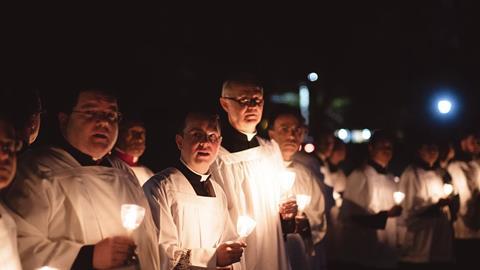Erik Strandness explores what a priesthood of all believers means and what that looks like in practice.
“But you are a chosen race, a royal priesthood, a holy nation, a people for his own possession, that you may proclaim the excellencies of him who called you out of darkness into his marvellous light. Once you were not a people, but now you are God’s people; once you had not received mercy, but now you have received mercy.” (1 Peter 2:9-10)
What does it mean to be a priest? Merriam-Webster defines a priest as “one authorised to perform the sacred rites of a religion especially as a mediatory agent between humans and God”. If we are all called to be priests, then maybe we are also called to be mediators of the relationship between God and the planet Earth. As image-bearers composed of dust and breath, we link the material with the immaterial, the physical with the spiritual, and the immanent with the transcendent. I believe God created us to be priests by not only caring for his earthly temple, but also by helping it raise its voice of praise.
We often think of priests as having specific training and aptitude, but the Bible tells us that we are all to be priests. How is that possible without seminary education or ordination? It’s possible because God created each one of us with special gifts, interests and skills that qualify us to exercise our priestly vocation by ministering in unique ways.
Read more:
Should we trust our brain or our emotions?
Is God hidden or have we lost our senses?
And it was very good: creation and humanity
The biologist listens to the confessions of the beasts and bushes and helps them raise a few Hail Marys and Our Fathers unto the Lord.
“But ask the beasts, and they will teach you;
the birds of the heavens, and they will tell you;
or the bushes of the earth, and they will teach you;
and the fish of the sea will declare to you.
Who among all these does not know
that the hand of the Lord has done this? (Job 12:7-9)
The meteorologist gives voice to the weather patterns that affect both the just and unjust.
“For he makes his sun rise on the evil and on the good and sends rain on the just and on the unjust.” (Mathew 5:45)
The environmentalist records nature’s paean of praise to the coming Lord.
“Let the sea roar, and all that fills it;
the world and those who dwell in it!
Let the rivers clap their hands;
let the hills sing for joy together
before the Lord, for he comes
to judge the Earth.” (Psalm 98:7-9)
The astronomer trains his or her telescope on the sky like a microphone and records a heaven that can’t keep quiet.
“The heavens declare the glory of God, and the sky above proclaims his handiwork. Day to day pours out speech, and night to night reveals knowledge.” (Psalm 19:1-2)
The mathematician reveals the abstract numbers that allow us to measure the waters in the hollow of his hand.
“Who has measured the waters in the hollow of his hand
and marked off the heavens with a span,
enclosed the dust of the earth in a measure
and weighed the mountains in scales
and the hills in a balance?” (Isaiah 40:12)
The rocks may cry out, but it is the geologist that gives them voice.
“He answered: ‘I tell you, if these were silent, the very stones would cry out.’” (Luke 19:40)
Get access to exclusive bonus content & updates: register & sign up to the Premier Unbelievable? newsletter!
We are all priests of our own unique religious orders strolling our spheres of influence and offering up the worship of our parishioners. Each voice unique yet combined in perfect harmony to praise almighty God.
“Make a joyful noise to the LORD, all the earth; break forth into joyous song and sing praises!” (Psalm 98:4)
Erik Strandness is a physician and Christian apologist who has practiced neonatal medicine for more than 20 years.























